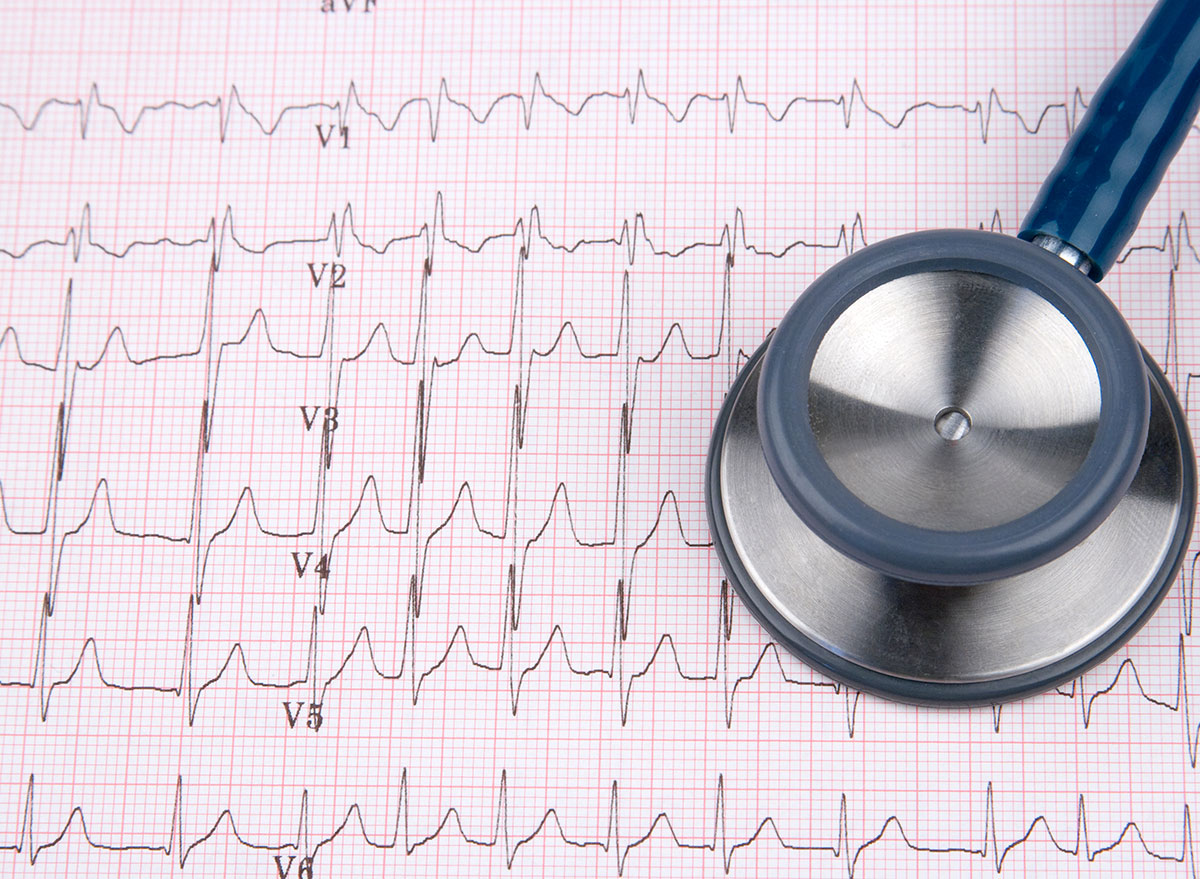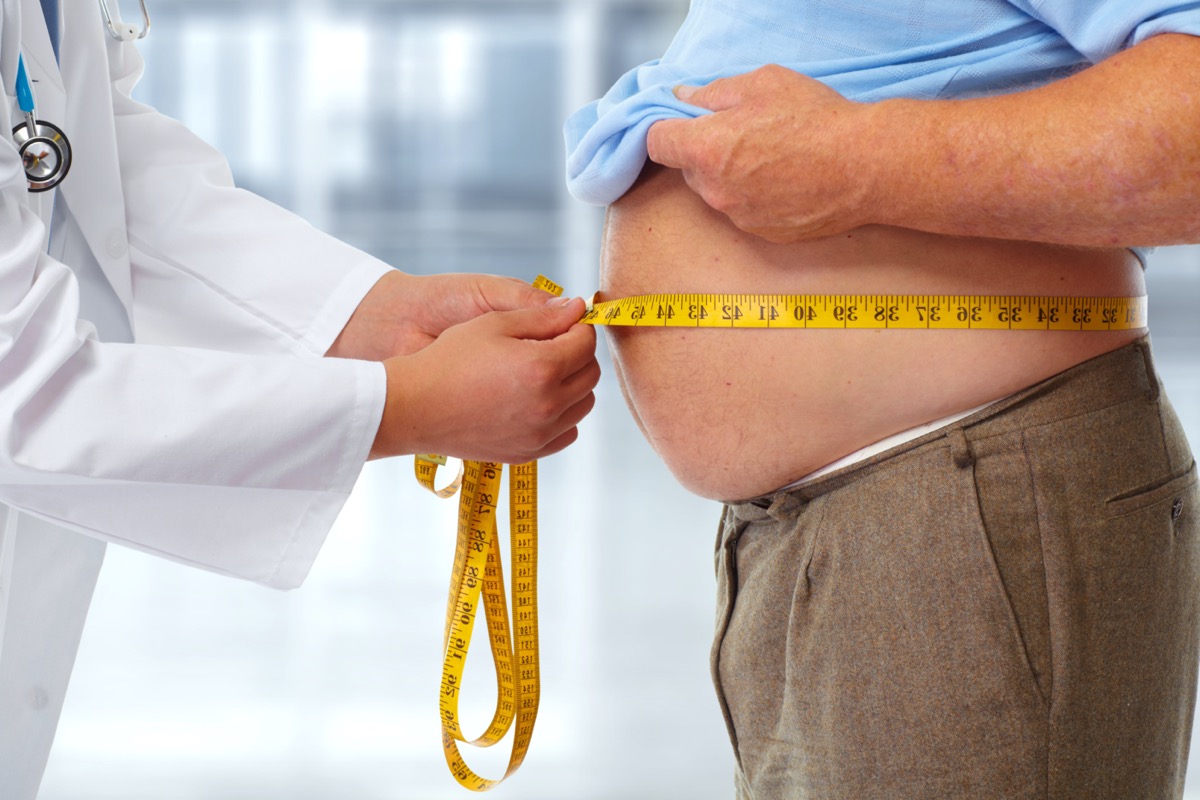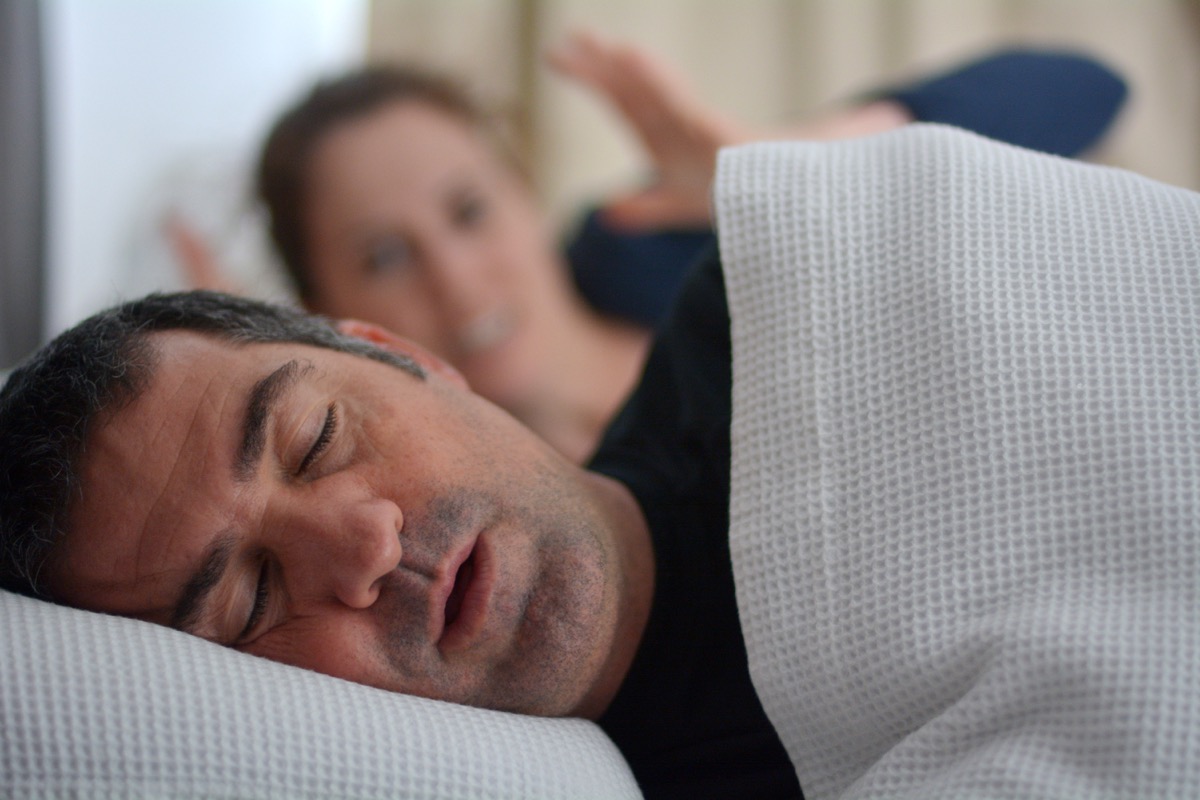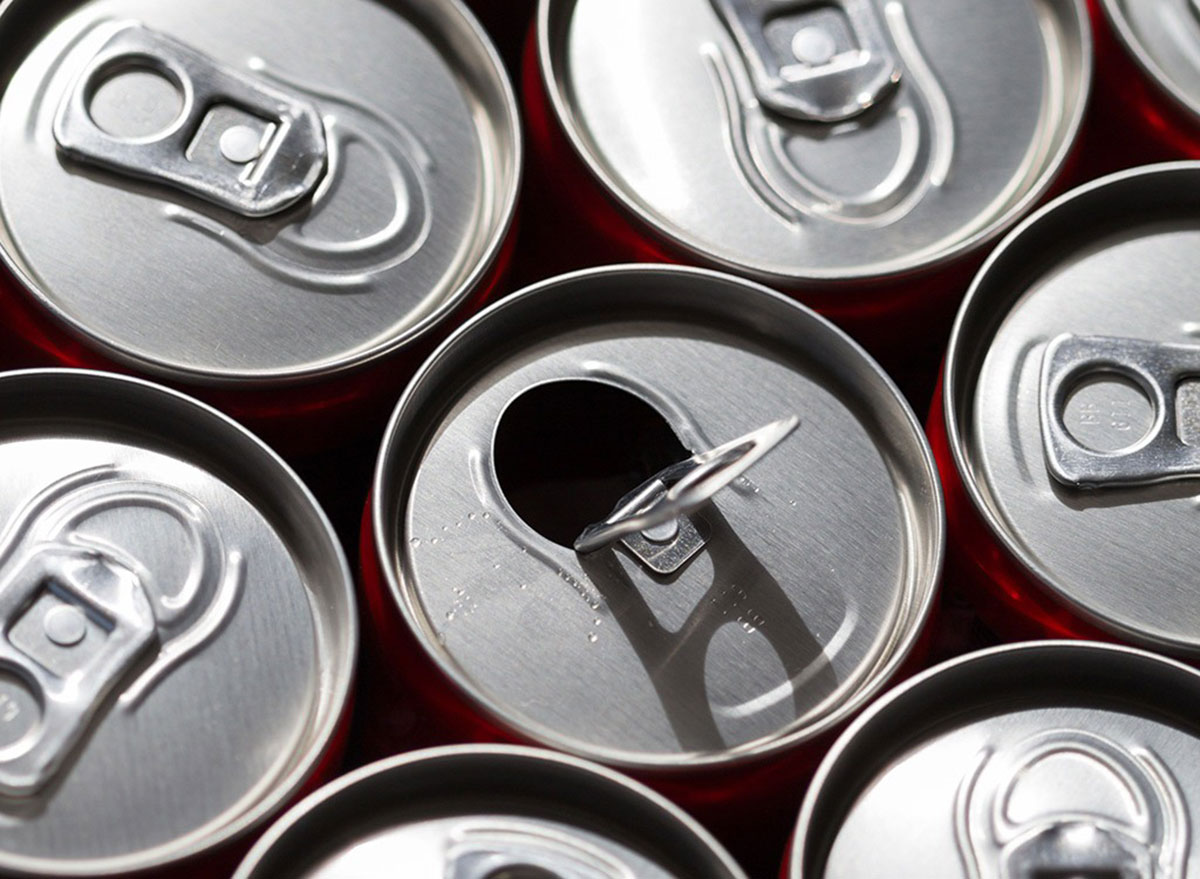50 Habits That Can Put You at Risk of a Heart Attack

You pour it out, wear it on your sleeve, and love people from the bottom of it. But do you take care—we mean, proper care—of your heart?
For decades, heart disease has been the No. 1 killer of Americans.
The good news: You can make quick, easy changes to your lifestyle to cut your risk and add years to your life, and it's never too late. Here are the top 50 things you're probably doing that put you in danger—from the Body Network to you, with all our heart.
Not Getting Your Blood Pressure Checked

Is your blood pressure in a healthy range? Are you sure? It might be higher than you think. In 2018, the American Heart Association lowered the guidelines for healthy blood pressure from 140/90 (and 150/80 for those older than 65) to 130/80 for all adults. According to Harvard Medical School, that means 70 to 79 percent of men over 55 technically have hypertension. Over time, that can weaken the walls of blood vessels, increasing your risk of stroke, heart attack and dementia.
How to fix it: To lower your risk, get your blood pressure checked soon — and regularly. Follow a heart-healthy diet, lose weight, and stay active. Read on to discover the best foods to eat.
Not Knowing Your Cholesterol Level

As we age, the body produces more cholesterol, which can build up in the arteries, increasing the risk of heart disease and stroke. In women, menopause causes LDL ("bad") cholesterol to rise and HDL ("good") to drop. Experts advise getting your cholesterol checked every five years, but older adults may need it done more frequently. Your total cholesterol level should be less than 200 milligrams per deciliter (mg/dL), with an LDL level of less than 100 mg/dL and an HDL level of 60 mg/dL or higher.
How to fix it: To keep your levels in a healthy range, eat a diet low in saturated fat and trans fats, get exercise and maintain an ideal weight.
Eating Too Much Saturated Fat

There's been some confusion around fats and cholesterol and heart health in recent years, but the latest science is this: According to the American Heart Association, eating foods high in saturated fat raises LDL cholesterol in your blood, which increases your risk of heart attack and stroke. What foods are high in sat fat? Red meat, chicken with skin, butter and cheese.
How to fix it: For good heart health, the AHA recommends that you consume only 13 grams of saturated fat per day. (For context, a 1 oz slice of Swiss cheese contains 5 grams of saturated fat. A McDonald's Quarter Pounder With Cheese contains exactly 13 grams.) Focus your diet on lean protein and as many colorful fruits and vegetables as possible.
Not Getting Enough Exercise

Lace up those old Reebok Pumps. The AHA's weekly exercise guidelines for heart health haven't changed, even though only about 20 percent of us follow them: 150 minutes of moderate-intensity exercise per week, or 75 minutes of vigorous exercise, plus muscle-strengthening exercise two times a week.
How to fix it: Some examples of moderate-intensity exercise are brisk walking, dancing, or gardening; vigorous exercise is running, hiking, or swimming. If you think you can't make 150 minutes, get moving anyway. Any amount of exercise is better for your heart than none.
Drinking Sugary Drinks

It's no secret that too many of us are drinking too many of our daily calories. And what's bad for your waistline is bad for your heart. A March 2019 study published in the journal Circulation found that drinking sugary drinks was associated with an increased risk of death, particularly from cardiovascular disease.
How to fix it: Switch out that soda for water or seltzer without artificial sweeteners. (Read on to find out why diet soda isn't the answer.) "Drinking water in place of sugary drinks is a healthy choice that could contribute to longevity," says Vasanti Malik, the study's lead author and a research scientist at the Harvard T.H. Chan School of Public Health.
Eating Too Much Sugar, Period

Consuming too much added sugar — the sugar that manufacturers add to foods to sweeten them or extend their shelf life — won't just blow your pants budget; it's a major risk factor for heart disease. According to the National Cancer Institute, adult men consume 24 teaspoons of sugar a day, the equivalent of 384 calories! "The effects of added sugar intake — higher blood pressure, inflammation, weight gain, diabetes, and fatty liver disease — are all linked to an increased risk for heart attack and stroke," says Dr. Frank Hu, professor of nutrition at the Harvard T.H. Chan School of Public Health.
How to fix it: The American Heart Association advises that adults consume no more than 150 calories (about 9 teaspoons, or 36 grams) of added sugar daily. That's about the amount in a 12-ounce can of soda. To learn how to reduce your sugar cravings and lose a pound a week, check out the 14-day plan Zero Sugar Diet!
Drinking Too Much Alcohol

Alcohol's effects on your liver and your beer gut are well-documented, but excessive drinking takes a toll on your heart, too. "Too much alcohol can increase blood pressure and triglycerides, which can increase your risk of heart disease," says Dr. Sarin Seema of EHE Health.
How to fix it: How much is too much? Seema recommends that women should have no more than one drink a day, and men should say when at two.
You Haven't Asked Your Doctor About Heart Testing

Little-known fact: Standard heart tests at your annual physical — and ECG and, in some cases, a stress test — aren't good at detecting clogged arteries until they're 70 percent blocked. You could ace both tests and still be on your way to a heart attack. Luckily, more advanced imaging and blood tests are available, along with genetic screening, to uncover arterial issues before they lead to heart disease.
How to fix it: Talk to your doctor about your personal and family health history to determine if it's time for a more extensive peek under your hood.
Drinking Diet Soda

Studies show that people who drink diet sodas and other artificially sweetened beverages have a higher risk of metabolic syndrome. That's when your body has trouble processing insulin, which is a precursor to Type 2 diabetes. And that's a heart attack risk.
How to fix it: Swap out sugary beverages and diet drinks with classic H20, seltzers or homemade spa water. There are some excellent seltzer options that are completely unsweetened (LaCroix or Polar), are infused with tea (Sound) or have low amounts of natural sugar from a dash of fruit (Spindrift). Avoid any with artificial sweeteners.
You Have Untreated A-Fib

One in four Americans over the age of 40 could develop a type of irregular heartbeat known as atrial fibrillation (AF or A-Fib). According to the Harvard Health Letter, because AF reduces the heart's pumping efficiency — by anywhere from 10 to 30 percent — it can lead to heart failure, angina and stroke.
How to fix it: If you're experiencing an irregular heartbeat — symptoms can include a fluttering in your chest, or you feel like your heartbeat is unusually rapid or slow — talk to your doctor, who can run basic tests like an ECG or refer you to a cardiologist, who may prescribe medication or other therapies.
RELATED: 15 Quick Ways to Lose Body Fat Percentage in a Week
Oversleeping

The principle "too much of a good thing" applies to one of the best things of all: Sleep, particularly as we age. A review of research published in the Journal of the American Heart Association found that getting more than eight hours of shut-eye can increase the risk of cardiovascular disease. Nine hours comes with a moderate risk — and 11 hours was associated with a nearly 44 percent increase! (Un-fun fact: Oversleeping also increases your risk for dementia.)
How to fix it: The latest recommendation from sleep experts, including the National Sleep Foundation, is that adults should get seven to nine hours of sleep a night — no more, no less.
You're Socially Isolated

It turns out the Lonely Hearts Club is a literal thing — and not a group you want to join. Feelings of loneliness and social isolation can increase a person's risk of having a heart attack, according to a study published in the journal Heart. People who reported poor social relationships had a 29 percent higher risk of coronary disease and a 32 percent higher risk of stroke than those with robust friendships. Why? Researchers believe loneliness increases chronic stress, a risk factor for heart disease.
How to fix it: Make it part of your routine to hit the gym, develop hobbies, take classes, call or Skype with friends or family. If you're feeling socially isolated or depressed, talk to your doctor about the best course of action. You might benefit from talk therapy too.
Carrying Around Extra Weight

Excess poundage weighs on your heart the most. Research shows that overweight people who achieve even modest weight loss (5 to 10 percent of total body weight) reduce their risk of cardiovascular disease.
How to fix it: Know your healthy weight range. Eating a plant-heavy diet, reducing your consumption of empty calories and processed foods, and being more active are three of the easiest ways to get there. Don't undertake a trendy diet like Keto without talking to your doctor.
Not Having Enough Sex

This one's easy. A review of research published in the American Journal of Cardiology found that having sex once a month or less increases your risk of cardiovascular disease. Although erectile dysfunction (ED) can be an indicator of heart disease, this review found an association between low sexual activity and heart disease independent of ED.
How to fix it: Get down to it. (Unfortunately, it's not clear from the study if masturbation had beneficial effects, but it couldn't hurt.)
Not Eating Enough Omega-3s…

Foods high in omega-3s are great for our heart. This type of unsaturated fatty acid may reduce inflammation throughout the body, decrease triglycerides, lower blood pressure and decrease heart disease risk, the Mayo Clinic says.
How to fix it: Eat whole-food sources of omega-3s like lean fish, grass-fed beef, walnuts and omega-3 eggs. The National Institutes of Health recommends women get 1,100mg and men have 1,600mg of omega-3s daily. Don't take a shortcut by popping supplements; research indicates they may be ineffective.
… And Eating Too Many Omega-6s

Be on the lookout for omega-3's cousin. Consuming too many omega-6s can raise your risk of heart disease. Although this polyunsaturated fatty acid is essential for health, most Americans eat too much. Scientists believe an excess of omega-3s can trigger inflammation throughout the body, which is bad for your heart. They're most commonly found in vegetable and corn oils, mayonnaise and salad dressings.
How to fix it: Experts say vegetable and seed oils are the biggest sources of omega-6s in the American diet. Cook with heart-healthy olive oil instead.
You Have Uncontrolled Diabetes

The risk of developing Type 2 diabetes increases dramatically over age 40, so much that the American Diabetes Association recommends a regular diabetes screening for all adults over 45. Diabetes causes sugars to build up in the blood; over time, that damages arteries and can lead to cardiovascular disease.
How to fix it: Get screened during your annual physical. If you're on medication for your diabetes, make sure you're compliant with dosages and monitoring.
Smoking

Cigarette smoking is the No. 1 preventable cause of death, according to the Cleveland Clinic. And lung cancer isn't the only major threat — toxins in cigarette smoke damage the lining of your arteries, causing them to thicken, while reducing the amount of oxygen in the blood. That spikes your risk of a heart attack.
How to fix it: Quit smoking ASAP; see your doctor for help. (It's never too late: Even people who quit smoking between the ages of 65 to 69 can add one to four years to their lives, the Cleveland Clinic says.) And if you don't smoke, this is not a golden-years habit you want to pick up.
A Sedentary Desk Job

A 2017 study at the University of Warwick found that workers with desk jobs had bigger waists and a higher risk of heart disease than those with more active jobs. What's more, workers' bad (LDL) cholesterol increased and good (HDL) cholesterol decreased with each hour beyond five hours of sitting a day.
How to fix it: If you work a desk job, converting to a treadmill desk might be a bit hardcore, but you should stand and move around as much as possible during the day.
Ignoring Your Family History

According to research published in the journal Circulation, men with a family history of heart disease had nearly a 50 percent increased risk of developing cardiovascular problems. The National Institutes of Health calls that family history a primary risk for heart disease. Are you doomed? No. But it's all the more reason to prioritize heart health.
How to fix it: Make sure your doctor knows about your family history and ask if any additional screening tests would be a good idea. "Your family medical history is a key, but complex, risk factor for heart disease," said Dr. Pradeep Natarajan, a cardiologist with Massachusetts General Hospital, in Harvard Men's Health Watch. "The risk factor will always be there, but the longer you live without developing heart disease with healthy behaviors, the smaller its effect."
RELATED: This Plan Is How to Lose 5 Percent Body Fat In 2 Weeks
Eating Ultra-Processed Food

We know that one key to heart health is to eat more whole foods and less processed junk, but experts have pinpointed a new enemy: What they call "ultra-processed food." Two May 2019 studies published in The BMJ link highly processed food with an increased risk of cardiovascular disease and an increased risk of early death. What's "ultra-processed"? The researchers listed "sausages, mayonnaise, potato chips, pizza, cookies, chocolates and candies, artificially sweetened beverages and whisky, gin and rum." In other words, stuff you know you should be avoiding anyway. In other studies, highly processed food consumption has been correlated with higher risks of obesity, high blood pressure, high cholesterol — all risk factors for a heart attack.
How to fix it: Limit the proportion of ultra-processed food you eat, and increase unprocessed and minimally processed foods—like any food recommended by Body Network.
Eating Too Much Salt

Studies show that most Americans consume about 3,400mg of sodium daily — way over the recommended 2,300mg (which amounts to about one teaspoon of salt). High salt intake is a major risk factor for high blood pressure, which in turn ups your chance of having a heart attack.
How to fix it: Not only should you put down the salt shaker (according to the American Heart Association, ¼ teaspoon of salt is 575mg of sodium) but limit your consumption of fast food and processed foods, which tend to come loaded with sodium. They have so much, in fact, that if you eat them frequently, you might be over a healthy limit even if you don't add salt to your meals.
Stressing Out All The Time

We all have stress, and no one wants to be called a snowflake, but science is clear that chronic stress is really bad for your body. "When stress is excessive, it can contribute to everything from high blood pressure, also called hypertension, to asthma to ulcers to irritable bowel syndrome," said Ernesto L. Schiffrin, M.D., Ph.D., professor in the Department of Medicine at McGill University. Hypertension is bad for your heart — and stress leads people to engage in other unhealthy behaviors that can tax your ticker, including drinking too much alcohol and stress-eating.
How to fix it: Exercising, not smoking, eating a healthy diet and maintaining a healthy weight are good ways to deal with stress, said Schiffrin.
Snoring

If you snore, it might be more than a nuisance for your bedmate. Snoring can be a sign of sleep apnea, during which breathing can stop for as long as a minute before your brain wakes you up to resume breathing. Sleep apnea has been associated with high blood pressure and other health problems. According to the National Sleep Foundation, snoring itself is associated with a risk of cardiovascular disease. People who snore have a higher chance of experiencing a thickening in the carotid artery, which doctors think might be caused by the vibrations of snoring.
How to fix it: If you snore or your partner points out your snoring, talk to your doctor—if not for yourself, then for your bedmate.
Not Getting Enough Sleep

Americans are chronically sleep deprived, and not only does it make us a real piece of work in the mornings, it's bad for heart health. According to a study done by the CDC, people who slept less than 7 hours a night reported having more heart attacks — along with obesity, Type 2 diabetes and high blood pressure, three conditions that lead to heart disease.
How to fix it: For optimum health and to lower your heart attack risk, get seven to nine hours of shut-eye a night.
Living in Lower Altitude Places

If you want to avoid experiencing a heart attack, move to the mountains! One 2017 study published in the journal Frontiers in Physiology found that those who lived in lower-altitude places had an increased risk of metabolic syndrome—one of the risk factors for heart disease and heart attacks.
How to fix it: If you do live in a lower altitude setting, you might not have the option of moving. However, you should be more cognizant of the other heart attack risk factors and focus on keeping them to a minimum.
Not Knowing What is in Your Supplements

According to Christina Murray, MD, Medical Director OU Medicine Cardiology, Pulmonary & Vascular Medicine, taking bad nutritional supplements could impact your heart health in a major way. "There is a risk of chemicals, extra caffeine and other products that may cause drug interactions that could put you at extra risk for a heart attack," she points out.
How to fix it: Before taking any nutritional supplement, always run it by your doctor.
Not Battling Inflammation

Although inflammation is not proven to cause cardiovascular disease, it is common for heart disease and stroke patients and is believed to be a sign of atherogenic response, according to the American Heart Association. "This irritation can increase one's risk of developing plaques in arteries (most importantly in the heart) and can cause a downstream effect of triggering blood clots leading to myocardial infarctions aka heart attacks," explains Alexandra Kreps, MD, at Tru Whole Care, who says sustained levels of inflammation can irritate blood vessels. "A marker in the blood called hs-CRP can measure inflammation and is correlated with one's risk of heart attack/heart disease in the future. This can be checked by your primary care doctor or cardiologist."
How to fix it: Dr. Kreps offers a few tips for reducing inflammation. First, maintain an anti-inflammatory diet (such as more fruits and vegetables containing omega 3 or the Mediterranean diet). Also, if you are obese, you should work on losing weight. Controlling blood sugar, exercise, and managing stress levels are other ways to battle inflammation.
Not Getting the Right Vitamins

A major risk factor for heart attacks is not getting enough magnesium and B vitamins, explains Jacob Teitelbaum, MD, integrative physician and author of the best-selling From Fatigued to Fantastic!. "Food processing has cut our magnesium intake by 50%, and this has been shown to increase abnormal heart rhythms and diabetes, along with increasing other risk factors," he explains. Optimal levels of B vitamins are also essential for bringing down elevated homocysteine levels.
How to fix it: Since it can be difficult to get enough of these from the American diet, he suggests taking special multivitamins that contain optimal levels.
Taking Over-the-Counter and Prescription Arthritis Medications

Certain medications can make you more prone to heart attacks, says Dr. Teitelbaum. "Called NSAIDs (e.g. ibuprofen), these are associated with a 35% increased risk of heart attack and stroke, causing 35,000 excess heart attacks yearly in the US," he points out.
How to fix it: A healthy alternative? Dr. Teitelbaum suggests "a unique highly absorbed curcumin plus Boswellia combination called Curamin, that has been shown to be more effective than NSAIDs in three studies but result in 'side benefits' instead of side effects." He claims that Glucosamine plus chondroitin has been shown to be equally effective as Celebrex, and actually decreases heart attack and death risk.
RELATED: The Ultimate Guide to Getting Fit as a Pear Body Type
Living in Chronic Pain

Don't try and suffer through your pain. "Chronic pain is still more dangerous than the medications," Dr. Teitelbaum points out. According to the Cleveland Clinic, chronic pain can lead to a chronic stress reaction that causes an increase in blood pressure and heart rate, increasing the risk for conditions such as heart disease.
How to fix it: Speak with your physician and figure out an effective treatment plan for your chronic pain.
Excessive Stimulant Use

Stimulants increase your heart rate and blood pressure, which are triggers for those already at risk of heart attacks, points out Thanu Jey, DC, Clinic Director at Yorkville Sports Medicine Clinic. "Many of us use caffeine which is generally safe in moderate amounts, but stronger stimulants such as cocaine and amphetamines multiply the effects on the heart and substantially increase your risk," he explains.
How to fix it: There are a million reasons you should avoid stimulant drugs, and heart attacks are just one of them. "If you are an at-risk individual, consult your doctor/cardiologist about caffeine and other stimulants," urges Dr. Jey.
Uncontrolled Anger

Similar to stress, anger can increase your risk of a heart attack as it increases your heart rate and blood pressure. "These can push you towards an episode, especially if you're already at risk," Dr. Jey points out. One 2015 study published in the European Heart Journal found that intense anger episodes increased the likelihood of acute heart occlusion, which obstructs blood flow to the heart.
How to fix it: "Understanding the effect anger can have on your physiological system is important in reducing this risk," Dr. Jey explains. In order to control your anger, speak with your medical expert. There are a variety of methods ranging from medications to therapy, that can help.
Poor Dental Hygiene

Bad dental hygiene can be responsible for a slew of medical problems, including heart health. A 2016 study published in the BMJ Postgraduate Medical Journal found that oral bacteria can increase your risk of atherosclerosis—aka hardening and narrowing of the arteries—increasing your likelihood of heart disease.
How to fix it: Make dental health a priority!
Skipping Your Morning Meal

Maintaining a healthy diet is an important part of heart health. While many people are fans of intermittent fasting, you might want to think twice before skipping your morning meal. According to one review of research published in the journal Circulation in 2013, there is a definite link between eating breakfast and a reduced risk of coronary heart disease.
How to fix it: Even if you have to eat on the go, make sure to start your morning with a healthy breakfast.
Working at Night

While spending a late night or two at the office probably isn't going to give you a heart attack, according to a 2016 study published in the Journal of the American Medical Association, working consistent long, late night shifts are going to increase your chances of heart disease.
How to fix it: While you shouldn't go out and quit your job, if you fall into this category you should think about reducing all your other risk factors.
Driving Everywhere

Traffic can be incredibly stressful. But, in addition to the stress-related heart health implications of driving a car, there is another component of driving you should consider. Riding your bike or walking instead of driving can reduce your heart attack risk, according to a study published in the journal Archives of Internal Medicine. Why? Obesity is directly related to heart health.
How to fix it: If you have an option, you should consider walking or riding instead of hopping in the car.
Having a Bad Boss

Because stress is a huge risk factor for heart disease and heart attacks, working in a stressful environment—including under the leadership of a bad boss—can really up your chances of cardiac arrest. In fact, one Swedish study published in the journal Occupational and Environmental Medicine confirmed this, finding that people with uncommunicative, secretive, inconsiderate, and incompetent bosses are 60 percent more likely to have a heart attack.
How to fix it: If you are constantly experiencing stress at work, you should seriously think long and hard about whether the situation is healthy and whether it is worth sacrificing your health over. If finding a new job isn't an option, you should take measures to reduce work stress—which could include meditation or exercise.
Having Lots of Children

We all know children are stressful, but science has actually confirmed that women who birth more babies are more likely to have a heart attack. According to a 2018 review of data in the European Journal of Preventive Cardiology the more times a person gives birth, the greater their risk of heart disease is.
How to fix it: If you do want a big family, make sure to keep all your other risk factors at a minimum—and consider hiring a nanny!
Spending Too Much Time Indoors

Being out in nature can improve your health in a number of ways, including your heart. According to a 2015 review of research published in Current Epidemiology Reports, exposing yourself to nature will improve both your mental and cardiovascular health. Why? According to the study, "higher levels of greenness were associated with lower risk of CVD, ischemic heart disease, and stroke mortality."
How to fix it: Make sure to get outside whenever you can.
RELATED: 12-3-30 Walking Method: 20 Proven Tips to Lose Weight Faster
Being Sick With the Flu

Getting the flu sucks in so many ways. But you might not know it can seriously impact your heart health. According to a 2018 study published in The New England Journal of Medicine, during those first seven days after influenza has been confirmed, you are much more prone to having a heart attack due to your compromised immune system.
How to fix it: Get the flu shot! It will not only reduce your chances of getting sick, but keep your downtime to a minimum.
Not Having Sex Regularly

Sex does a body—and heart—good. According to a review of research published in the American Journal of Cardiology being sexually active by doing the deed more than once a month, will decrease your risk of cardiovascular disease.
How to fix it: Stay sexually active! And keep it safe.
Untreated Depression

Depression can negatively impact your health in so many ways, your heart included. 2014 research published in Psychosomatic Medicine found that treating depression early can reduce your risk of cardiovascular disease by half.
How to fix it: Don't let your depression go untreated. Speak to a mental health expert ASAP about treatment options.
Not Properly Hydrating

Drink up—water that is! Research published in the European Journal of Nutrition found that even minor dehydration can increase your risk of cardiovascular disease—even in healthy young adults.
How to fix it: Make sure to stay hydrated.
Getting a Divorce

Divorces can be incredibly stressful, and may even put you at risk for a heart attack. A 2017 study published in Cardiology Research and Practice found that women who went through a divorce were more prone to heart conditions, including heart attack. Those who went through multiple divorces were at an even higher risk.
How to fix it: Obviously, staying in an unhealthy marriage isn't the solution. However, marrying the right person and keeping your marriage as healthy as possible are things that are going to help your heart health.
RELATED: Benchmark Your Progress with Our Lean Body Mass Calculator
Financial Stress

Stressing out about money can take a serious toll on your heart health. One study conducted by the American Psychological Association found that those experiencing financial stress were 13 times more likely to suffer from a heart attack.
How to fix it: Try and keep your finances as stable as possible.
Living Near Fast Food

The more convenient it is to indulge in greasy food from McDonald's or Taco Bell, the more likely you are to suffer a heart attack. A Dutch study published in the European Journal of Preventive Cardiology found that adults living within a half-mile of fast food outlets were more likely to develop heart disease than those living further away.
How to fix it: If you do live near fast food joints, resist the urge to become a regular.
Eating Out

With our busy lifestyles it can be tempting to eat the majority of meals out at restaurants. However, you could be putting your heart health at risk. According to a recent study published in the Journal of the American College of Cardiology, those who engaged in "social-business" eating were over a third more likely to have dangerous plaque build-up in their arteries, putting them at increased risk for heart attack and heart disease.
How to fix it: Consider following a heart-healthy diet, such as the expert-endorsed Mediterranean Diet. When you do eat out, make healthier choices.
Not Being a Pet Owner

Owning a pet—preferably a dog—can seriously lower your chances of heart disease. The American Heart Association points to numerous studies supporting pet ownership as an effective strategy for keeping heart attacks at bay. Why? Having Fido around has been found to increase fitness levels, relieve stress, lower blood pressure and cholesterol levels, and boost overall happiness and well-being. Also, pets provide social support.
How to fix it: If you aren't in a place to become a pet owner, consider spending time with other people's pets in order to reap some of their heart-healthy benefits.
Too Much Screen Time

Spending too much time glued to a phone, television, or tablet has been directly linked to obesity—one of the biggest risk factors of heart disease.
How to fix it: Swap your screen time for other healthier and more active habits. Socially interacting with others, playing a sport, picking up a new hobby, or just taking a walk are all things that will improve your health in a variety of ways, including reducing your risk of a heart attack.




